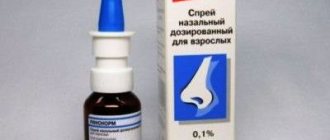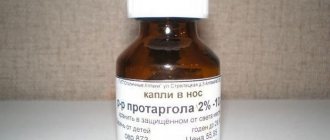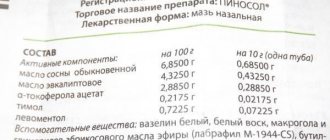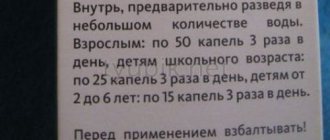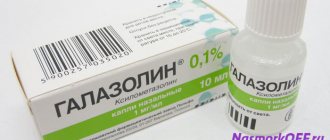The drug Tizin is an effective remedy aimed at combating runny nose, both of allergic and infectious origin. In otolaryngology, this drug is used topically. Being an alpha-adrenergic agonist, it has a vasoconstrictor and anti-edematous effect.
The therapeutic effect of Tizin drops occurs a couple of minutes after application and lasts for a long time - about 8 hours. The drug is popular in the treatment of pathologies of the ENT organs. The effect of the drug is due to the active substances included in its composition.
Effect of the drug
Coming into contact with the mucous membrane of the nose and nasopharynx, the drops have an active symptomatic effect, successfully eliminating the symptoms of rhinitis. The drug works as an alpha-adrenergic agonist, simultaneously providing vasoconstrictor and decongestant effects. In a short period of time, a vasoconstrictor effect is achieved, which lasts up to 8 hours.
The composition of Tizin is highly effective not only for runny nose of bacterial and viral origin, but also for allergic ENT pathologies that are extremely uncomfortable for humans.
Treatment with the drug, according to the instructions, is acceptable for both adults and children, starting from an early age. Tizin nasal drops are a low-toxic drug, and the therapeutic effect they have will be immediate and lasting.
Indications
The instructions for use indicate that Tizin is prescribed for the following conditions and diseases:
- rhinitis,
- sinusitis,
- pharyngitis,
- hay fever,
- hay fever.
The drug is also used during diagnostic and therapeutic procedures, if it is necessary to eliminate swelling of the nasopharynx and normalize nasal breathing. It is not recommended to use nasal drops for more than 5 days, otherwise the patient may experience atrophy of the nasal mucosa.
Mode of application
The use of the drug Tizin Xylo is considered justified in the following situations:
- lack of nasal breathing due to severe congestion;
- inability to breathe through the mouth due to sore throat;
- impaired nasal breathing and high body temperature;
- insufficient humidity in the room where the patient is (threat of mucus drying out);
- suspicion of the development of otitis media.
Tizin drops and spray are used only intranasally in the concentration indicated by the patient’s age. For children over 2 and under 6 years old - 0.05% spray, for schoolchildren - 0.1%.
The recommended frequency of use of the drug should not be more than 3 times a day, and the duration of treatment is more than a week for adults and 4-5 days for children.
In some cases, it is allowed to change the rules of use and dose at the discretion of the attending physician, depending on the diagnosis, the severity of clinical manifestations and the patient’s condition. Repeated treatment is possible after a few days if necessary.
Tizin Xylo has not been thoroughly studied in terms of its effect on the fetus and its excretion in milk during lactation, therefore it is not recommended for use by expectant mothers and nursing women.
In case of chronic rhinitis, the use of the drug is possible only under the supervision of an otolaryngologist due to the risk of developing an atrophic process of the nasal mucosa. For effective treatment, the medicine should not be used after the expiration date; the bottle can be stored at room temperature, but not more than 25 degrees Celsius, out of the reach of children. The manufacturer claims a shelf life of 3 years.
It will also be interesting: Which is better Cetrin or Claritin - what to pay attention to
Contraindications
Contraindications to the use of Tizin are as follows:
- individual hypersensitivity,
- angle-closure glaucoma,
- dry form of rhinitis,
- simultaneous use of monoamine oxidase inhibitors.
There are also age-related contraindications:
- 0.05% the drug is not prescribed until the age of two,
- The 0.1% drug is not recommended for children under 6 years of age.
Tizin is prescribed with caution during breastfeeding, during pregnancy, for endocrine disorders, and diseases of the cardiovascular system. It is also recommended that people who drive vehicles and operate complex machinery be more careful.
special instructions
For chronic rhinitis, Tizin Xylo is used only under the supervision of a physician, since long-term treatment increases the risk of atrophy of the nasal mucosa.
The drug is not recommended for use in case of increased individual sensitivity to benzalkonium chloride, which is included in the spray as a preservative.
Tizin Xylo should be used in recommended doses, especially in elderly patients and children.
With short-term treatment, the likelihood of the drug affecting the ability to drive vehicles or operate potentially dangerous mechanisms is minimal. However, with long-term use or use of Tizin Xylo in high doses, the possibility of systemic side effects, in particular, effects on the cardiovascular system, cannot be completely excluded. Which can impair the patient’s ability to perform types of work that require increased concentration and speed of psychomotor reactions.
Instructions
The drug is prescribed intranasally.
Tizin 0.1%, unless otherwise recommended by a doctor, is prescribed to adults and children over 6 years old, 2-4 drops in each nasal passage.
Tizin 0.05%, unless otherwise prescribed, is instilled in 2 drops for children from 2 to 6 years old.
The drug should be used strictly as needed, but not more than once every 4 hours. As a rule, these drops are used much less frequently, since their therapeutic effect lasts at least 8 hours. Using the product in the evening ensures a peaceful fall asleep and sleep throughout the night.
Composition and properties
The active ingredient of the drug Tizin drops is tetrizoline hydrochloride (a short-acting alpha-adrenergic agonist). Tizin Xylo in the form of a spray contains xylometazoline (a sympathomimetic of medium duration of action). The manufacturer produces these drugs in a concentration of 0.05% (children 2 - 6 years old) and 0.1% (for children over 6 years old and adults); these products are not suitable for children under 2 years old. In addition to the main component, Tizin spray contains additional synthetic substances that give the medicine a colorless, tasteless and odorless appearance. The children's spray contains 140 doses, and the adult spray contains 70 doses of the medicine.
Sympathomimetics included in Tizin spray and drops are substances that have a vasoconstrictor effect, so they are widely used in ENT practice for local relief of swelling and restoration of nasal breathing.
You may also be interested in: Is it possible to put antibiotics in your nose?
The effect of the drug begins within a minute after application, finally reaches a maximum after about 5-7 minutes, and lasts up to 6-8 hours. Tizin improves the condition of the nasal mucosa, reduces hyperemia, promotes better discharge of secretions and cleansing of the nasal passages, thereby equalizing the pressure in the auditory tube, which is important for the prevention of otitis media. When applied topically, the medicine does not have a systemic effect on the body. However, in children, especially in the first year of life, the mucosa is thin and more permeable, so absorption is easier and the risk of developing systemic reactions is higher.
Tizin Bio
Tizin Bio is a vasoconstrictor used topically in otolaryngology.
The active ingredient of Tizin Bio is an alpha-adrenergic agonist - xylometazoline hydrochloride. Release form: spray. The drug narrows the blood vessels of the nasal mucosa, eliminates swelling and hyperemia, restoring nasal breathing during rhinitis.
Hyaluronic acid in Tizin Bio creates a feeling of hydration and helps speed up the process of restoration of mucous membranes damaged during the disease.
Tizin Allergo
Tizin Allegro is a topical antiallergic drug. The active component of the drug, levocabastine hydrochloride, has an effect on histamine receptor blockers.
After a short course of treatment with the drug, the patient’s signs of allergic rhinitis disappear: copious discharge from the nasal cavity and swelling of the nasopharynx disappear.
Indications for use of Tizin Allergo:
- allergic rhinitis,
- exacerbation of hay fever in the phase of rhinoconjunctival syndrome,
- allergic conjunctivitis.
Tizin for allergies is available in the form of a spray. The drug has a quick effect, eliminates the symptoms of allergic rhinitis and improves the patient’s quality of life.
Release form and composition
Tizin Xylo is available in the form of a nasal spray dosed 0.05% (for children) and 0.1% (for adults): a clear, colorless solution with a slight characteristic odor or odorless (10 ml in dark glass bottles with a dosing device and a screw cap made of pull-off polyethylene, 1 bottle in a cardboard box).
Composition of 1 ml solution:
- active ingredient: xylometazoline hydrochloride – 0.5 mg (0.05% spray) or 1.0 mg (0.1% spray);
- auxiliary components: sorbitol 70%, disodium edetate, sodium chloride, benzalkonium chloride, disodium hydrogen phosphate dihydrate, sodium dihydrogen phosphate dihydrate, purified water.
1 bottle of Tizin Xylo 0.05% contains at least 140 doses of spray; Tizin Xylo 0.1% – at least 70 doses.
Content of xylometazoline hydrochloride in one dose of the drug:
- spray 0.05% – 0.035 mg;
- spray 0.1% – 0.14 mg.
Tizin for pregnant women
According to the instructions for use, Tizin drops or spray should be prescribed to expectant mothers with caution in cases where the use of this remedy simply cannot be avoided.
But the drug can only be prescribed by someone who will monitor the condition of the woman and fetus during the treatment process. In other cases, Tizin is contraindicated for pregnant women, since there is no accurate information about the safety of treatment with this drug and its effect on the fetus.
If there is a need to use Tizin during lactation, then it is advisable to switch the baby to artificial formulas for the period of treatment.
Side effects
Side effects of Tizin and Tizin Bio include:
- from the nervous system - drowsiness, general weakness, dizziness, migraine, tremor, sleep disorders,
- from the heart and blood vessels - cardiac dysfunction, increased blood pressure,
- from the endocrine system - hyperglycemia,
- from the digestive system - nausea, heartburn,
- from the respiratory system - burning and dryness in the nasal cavity, sneezing, secondary swelling of the mucous membrane as a result of exceeding the dose of the drug or with prolonged use,
- from the organs of vision - increased intraocular pressure, dilation of the pupil.
Side effects
In patients with hypersensitivity, the drug may cause sneezing, mild transient burning of the nose, hypersecretion and paresthesia.
Sometimes after using Tizin Xylo, reactive hyperemia (increased swelling of the nasal mucosa) is observed.
With frequent or prolonged use of the drug, as well as its use in high doses, a burning sensation or dryness of the nasal mucosa and reactive congestion with the development of medicinal rhinitis may occur. A similar effect was observed even 5–7 days after the end of therapy, and with long-term treatment it can cause dry rhinitis (irreversible damage to the nasal mucosa with the formation of crusts).
Very rarely, with prolonged use of high doses of Tizin Xylo, increased fatigue or insomnia, headache, and depression may occur.
In isolated cases, systemic side effects (arrhythmias, palpitations, increased blood pressure, tachycardia, visual impairment) were observed with local intranasal use of sympathomimetics.
Overdose
In case of an overdose of Tizin, the following symptoms may occur:
- nausea,
- pupil dilation,
- heart rhythm disorders,
- increased blood pressure,
- pulmonary edema,
- mental disorders,
- increased drowsiness,
- state of shock
- respiratory arrest,
- coma.
The drug does not have an antidote. In case of overdose, Physostigmine, Activated carbon, symptomatic therapy, and, in extreme cases, gastric lavage and artificial oxygen supply are prescribed as first aid if anticholinergic symptoms occur.
Analogs
You can replace Tizin with the following drugs:
- Nazivin. A nasal agent of the alpha-adrenergic agonist group, widely used in ENT practice. Release form: spray or drops. The active ingredient is oxymetazoline hydrochloride, which has a vasoconstrictor and anti-edematous effect. Nazivin, as an analogue of Tizin, is prescribed for the treatment of acute, vasomotor and allergic rhinitis, eustachitis and otitis media.
- Xylene. A drug based on a vasoconstrictor component, used in otolaryngology to treat the common cold. Release form: spray and drops. The active ingredient is xylometazoline. The drug is prescribed for acute rhinitis, including allergic origin, sinusitis and otitis media.
Many patients do not take specialists’ recommendations seriously on how to take Tizin, exceeding the dosage of the drug or increasing the course of treatment. Doing this is highly undesirable due to the high risk of side effects.
Tizin, like any medication, contains chemicals to which, if their concentration is unjustifiably exceeded, the body can react unpredictably.
Olga Rogozhkina,

